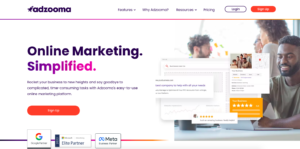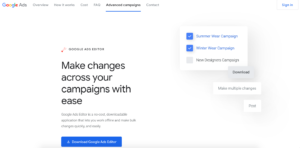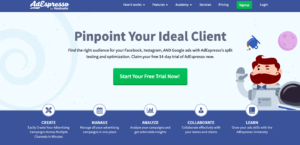Organic traffic doesn’t always cut it! Business owners (like you) often look for ways to accelerate their web traffic without paying a fortune. A PPC system is a perfect solution to boost web traffic, target ideal buyers, and accelerate conversions.
PPC ads can increase brand awareness by 80%, and traffic from these paid ads has a 50% chance of converting compared to organic traffic. Many marketers and brands see the power of PPC ads, with almost 100% of marketers investing in paid media and 62% increasing their PPC ad budgets.
But what is a PPC system?
How does a PPC system work?
And what are the best PPC systems to use in 2024?
These are all valid questions, and once you understand how to leverage a PPC system for your brand, you can create, manage and track your paid ads’ performance with one tool!
Don’t worry! We’re not going to let you figure this out by yourself.
We’ve done our research and tested several PPC systems to find the five best options for businesses. Plus, we cover what PPC systems are, how they work, and PPC operators vs. management.
Ready to learn about PPC systems and maximize your revenue?
Here we go!
Pay-per-click (PPC) is a digital advertising model. The advertiser pays each time users click on their ads and get to their website, landing page, or app. You can use PPC ads on search engines, social media, popups, websites, and many other platforms.
PPC advertising works because the point is to tailor your ad’s content to target qualified leads and earn more than what you spend per click. So, if you spend $2 per click and the user spends $100, you’ve made a generous profit.
Advertisers can use loads of different formats for their PPC ads. You can create your ad with text, images, and videos and use different shapes and sizes to complement your content and ad placement. So, how do users find your PPC ads? And how do you invest in PPC ads? Let’s get into that now!
Summary: What is PPC?
Pay-per-click (PPC) is an online advertising model where advertisers pay each time users click on their ads.
Source: HubSpot Marketing
How PPC ads work varies between platforms. If you’re using PPC ads on search engines like Google or Bing users will find your ad through keywords. SEO also matters for PPC ads on social media and websites. The platform’s (social platform or website) algorithm will match your ad to users searching for your target keyword or synonyms.
When creating PPC ads, ensure your content is relevant to your business and target audience. With accurate, customer-centric content, users will effortlessly find your ad.
But enough about SEO! Let’s look at the other components of how PPC ads work:
First, choose the platform for your PPC ads and the type of campaign you’ll use. These platforms include search engines, apps, and social media channels. Most businesses use Google and Microsoft as search engines for PPC ads campaigns.
There are many PPC ad campaigns to leverage, depending on your objectives. Do you want to redirect old visitors to your website? Retargeting PPC ad campaigns are best for this purpose! Or do you want to drive qualified web traffic to secure higher conversions? Social media ads and display ad campaigns are top choices!
Brands must know what they want to gain from PPC ads to choose the best platform and campaign type.
Major PPC ad platforms like Google, Microsoft, LinkedIn, YouTube, Instagram, and Facebook allow businesses to configure their PPC ad settings for accurate targeting. You can hone in on your targeted audience through settings like location, device, user interactions, and keywords. Be specific in your settings and adapt them to your brand and PPC ad goals as much as possible.
Your settings largely determine how likely your ads are to target the right audience. And because you spend money per click, your ad’s settings are imperative to drive revenue. If the wrong users click on your ad, you’ll pay more than you make!
Now, we’re getting to the juicy bits! PPC ads work on a bidding system. This bidding system, known as the Ad Auction, is an automated section of PPC ad platforms. In the Ad Auction, businesses bid for specific keywords they want to target. The more competitive the keyword, the higher you’ll bid.
You can use SEO tools like SEMrush and UberSuggest to find the best keywords for your PPC ad campaign and the average per-click cost. So, how do you win the bidding process? After using your keyword research to create a buyer-centric PPC ad, you’ll upload your ad to the Ad Auction. This automated platform analyzes the competing ads and picks the best ones based on the value of your bid, the quality of your content, and how relevant your ad is.
Because you can’t simply win an ad placement on the Ad Auction, perfect your ad content and ensure it’s relevant to your niche and target buyers.
So, you know how ad bidding works. Let’s not forget about setting a budget for your PPC ads!
Businesses can set their daily budgets on how much they’re willing to spend on ads, per click. Your PPC ad campaign will never exceed this amount, and it works to ensure you don’t spend more than you can on your PPC ads.
Summary: How does a PPC System Work?
There are two different PPC systems marketers and businesses can leverage. These types include PPC management systems and PPC operator systems.
Let’s explore how these two systems differ:
PPC management systems are all-in-one solutions to manage your PPC campaign across multiple channels. If you’re running PPC ad campaigns on Facebook, Google, Instagram, and Microsoft, your PPC management system allow you to track and stay ahead of your ads from one system. Many PPC management systems enable businesses to create ads, and custom tracking reports and invite team members for collaboration.
PPC management systems are ideal if you’re running multiple paid media campaigns on different platforms. Using these PPC systems can simplify this process, and you can effortlessly compare all your campaigns’ performances, despite them existing on different verticals.
PPC operator systems work when businesses pay publishers every time users click the publisher’s ad and arrive on that business’s website/landing page. Your publishers will set up the operator system on their websites, so you can track your clicks, conversions, and cost-per-click (CPC) rate. Although PPC operator systems exist on the publisher’s website, as the advertiser, your company must provide the software.
Many businesses create PPC operator system’s from scratch. However, this method may have high costs and require a lot of resources. You must have skilled developers to avoid coding bugs or a non-functioning system. An alternative option is to purchase white-label PPC system operators and add your custom branding to the software so that when publishers sign up, the system looks like yours!
Summary: PPC Systems: Management vs. Operator
PPC management systems allow businesses to manage and track PPC campaigns on different platforms using one software. You can use these systems to manage all your PPC campaigns simultaneously, despite them existing on different platforms. PPC operator systems is software ad publishers use on their websites to track the advertisers CPC rates. The advertiser must provide this software, and you can build your PPC operator system form scratchy or but white-label software and rebrand it.
The best PPC management systems include SEMrush, Adzooma, Google Ads Editor, Adespresso and Skai. Let’s dive into what these PPC management systems offer:
SEMrush is one of the best PPC ad management systems for SEO. As one of the most beloved SEO platforms, SEMrush can help you find and track the best keywords for your PPC ads. You can also audit your website to determine which keywords are performing best, influencing your PPC ad keywords.
The competitor analysis tool will tell you what keywords your competitors rank for and how to leverage this to win PPC ad bids. SEMrush offers specific features for PPC ads, making this system a top choice to optimize and manage all the SEO aspects of your ad campaign.

Key Features:
Pricing:
Pros:
Cons:
Website: semrush.com
G2 Score: 4.6/5
Adzooma is an easy-to-use PPC system to help optimize and manage your Microsoft, Google, and Facebook ads. Businesses and freelancers love this tool because you can use Adzooma’s automated Google Ad campaign feature to create a tailored ad campaign for you! This feature is valuable for PPC ad rookies or brands that don’t have enough time to create campaigns from the ground up.
You can also benefit from Adzooma’s real-time recommendations to optimize your ad content, and you can view your tracking and analytics from one dashboard. Adzooma allows businesses to create custom reports, or evaluate your ads’ performance through their generic reports.

Key Features:
Pricing:
Pros:
Cons:
Website: adzooma.com
G2 Score: 4.4/5
Google Ads Editor is the perfect PPC management system to edit and optimize Google Ads. While this tool isn’t super robust, it’s a free solution to edit and track multiple ad campaigns at once.
You can replace and search for text amongst multiple campaigns, copy and move items between campaign groups and undo and redo your edits.
This tool is super easy to use, and it’s a safe bet for marketers and startups that need basic ad editing. Google Ads Editor also allows businesses to edit their ads offline. You can also track your campaigns, earnings, and traction from one dynamic dashboard.

Key Features:
Pricing:
Pros:
Cons:
Website: ads.google.com
G2 Score: N/A
Many brands have mixed feelings about AdEspresso, and we understand why. While some of the features need improvement, this PPC ad management system provides robust features for customer-centric ad campaigns through A/B testing.
You can use these functions for Facebook, Instagram, and Google ads. For PPC ad management, AdEspresso allows businesses to create custom ad optimization rules based on specific events and triggers.
This platform has a data sync tool to automate your retargeting efforts. So, instead of creating new audiences for every ad campaign, you can integrate up to 12 data tools and save these audiences in your Asset Manager for repeat use.

Key Features:
Pricing:
Pros:
Cons:
Website: adespresso.com
G2 Score: 3.3/5
Looking for an all-in-one PPC ad management platform? Look no further than Skai! This advanced tool has everything mid-level, and large businesses need and more! You can find the top keywords for your ad campaigns, track and manage these keywords and run campaign experiments to find the best content for your audience.
Skai offers an automated budget navigator, so you can monetize your income and expenses and ensure you don’t spend more than you can on PPC ads. To top things off, you can draw custom reports to track and evaluate your campaign’s performance.
Skai provides an intuitive, unified dashboard to track and compare all your campaign data. And if you thought it couldn’t get any better, think again! Skai also has tools for ad bid management, and optimization and automated retargeting audiences.

Key Features:
Pricing:
Pros:
Cons:
Website: skai.io
G2 Score: 4/5
Summary: 5 Best PPC Management Systems
PPC systems are the best ways to leverage paid media and optimize your web traffic and conversions. While organic traffic doesn’t always drive your desired sales, you can use PPC systems to boost your results.
Businesses can use operator PPC systems or PPC management systems. You can also use both PPC systems if it works for your brand! Invest in any of the best PPC management platforms to maximize your paid media returns.
Pay-per-click (PPC) is an online advertising model where businesses pay each time web users click on their digital ads. There are many platforms brands can use for PPC ads, including social media channels and search engines. Read this article to find out what PPC systems are, how PPC systems work and the best PPC management platforms in 20243.
PPC systems work by choosing your campaign and platform for your paid ads, configuring your ads for accurate targeting and setting your budget and bidding. While PPC systems differ between campaigns and platforms, this is the basic of how it works. Read this article to understand what PPC systems are, how to use PPC systems, PPC operator vs. management systems and the top PPC management software for businesses.
The top PPC management systems include SEMrush, Adespresso, Adzooma, Google Ads Editor and Skai. These platforms offer key features for PPC systems that convert. This article covers what PPC systems are, how they work and PPC operator vs. management systems. Plus, we provide the pros, cons and ratings of the top PPC management systems in 2024.
SmallBizGenuis: 34 Profitable PPC Stats to Keep Your Eye on in 2024
DigitalThirdCost: PPC Statistics for 2024